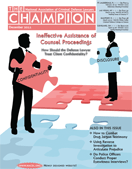December 2011

Read about ineffective assistance of counsel proceedings drug jargon testimony eyewitness accuracy post-conviction claims gait analysis in DWI defense and more.
Articles in this Issue
-
‘So What?’: Using Reverse Investigation To Articulate Prejudice and Win Post-Conviction Claims
Attorneys representing clients in capital post-conviction proceedings should focus on the “prejudice” that the law requires they prove in order to win relief for their clients. Too many lawyers focus on “error” at the trial court level without marshaling their resources to address the “so what?” question that is usually the impediment to relief in the courts. Ty Alper’s approach — which he calls “reverse investigating” — applies to capital and non-capital post-conviction cases.
-
A Survey of Law Officers And Its Significance for Cross-Examining Witnesses About Eyewitness Accurac
The authors surveyed law enforcement officers(1) to test their knowledge about memory, (2) to test their knowledge of how factors present during crimes (weapons, disguises) can affect eyewitness accuracy, and (3) to determine how they conduct eyewitness interviews and identification procedures. According to the survey results, most officers do not conduct proper eyewitness interviews and identification procedures, and have limited knowledge of eyewitness factors. These deficits suggest a framework for a defense attorney’s cross-examination of officers and eyewitnesses at hearings and trials.
-
Affiliate News
Affiliate News Gerald Lippert Affiliate News December 2011 13 Friedman Named OACDL’s Lawyer of the Year At its recent Superstar Seminar in Columbus, Ohio, the Ohio Association of Criminal Defense Lawyers (OACDL) presented its First Annual Lawyer of the Year Award to its past president, I
-
Book Review: The Rape Case: A Young Lawyer's Struggle for Justice in the 1950's
Book Review: The Rape Case: A Young Lawyer's Struggle for Justice in the 1950's
-
Informal Opinion: Minorities Still Burdened With Mandatory Minimum Sentences
Minorities Still Burdened With Mandatory Minimum Sentences (Informal Opinion)
-
It Means What It Needs to Mean: Combating Drug Jargon Testimony
“Drug jargon” is the term used by law enforcement officers when they tell a jury the meaning of certain words and phrases in cases alleging drug-dealing. For example, the word “snow” in context can mean cocaine. Courts permit drug jargon testimony as expert testimony under Rule 702 of the Federal Rules of Evidence or as lay opinion testimony under Rule 701. This article will help the defense to develop effective objections as to why drug jargon testimony is not admissible as expert or lay opinion testimony.
-
NACDL Begins Hearings on Collateral Consequences, Barriers to Re-Entry (NACDL News)
In United States v. Jones, the Supreme Court will decide whether law enforcement may conduct GPS surveillance 24 hours a day and seven days a week without probably cause and without judicial oversight.
-
NACDL Releases Grand Jury Reform Report (NACDL News)
NACDL Releases Grand Jury Reform Report (NACDL News)
-
Obama’s First Capital Case at Guantánamo
Obama’s First Capital Case at Guantánamo
-
Offering Up Our Brothers and Sisters with Criticism (From the President)
Defense lawyers should refrain from criticizing other defense lawyers. The criticism usually takes the form of a remark expressing disapproval of legal strategy in a high-profile case. Defense lawyers should support the defense - no matter how bad the facts, the lawyer, or the client.
-
Protecting the Rights Of the Accused: Heeney Award Winner William R. Gallagher
Protecting the Rights Of the Accused: Heeney Award Winner William R. Gallagher
-
Using Gait Analysis and Medical History for DWI Defense
In reaching the decision to arrest an individual for DWI, an officer often relies upon physical roadside “testing” to assess the driver’s sobriety. Unsteadiness is among the most common indicators of impairment recounted by police officers. During the initial intake meeting with the client, a medical history should be obtained, inquiring as to whether any physiological factors affected behavior overall at the time of the arrest, but specifically, whether any injury pathology would have caused any problems in balancing. Consider having the client medically and physiologically evaluated by a podiatrist or orthopedic specialist who can offer an in-depth look into the client’s pattern of walking.
-
What (Can) (Should) (Must) Defense Counsel Withhold From the Prosecution in Ineffective Assistance o
ABA Formal Opinion 10-456 is an opinion that every criminal defense lawyer facing or bringing a claim of ineffective assistance of counsel (IAC) should read. The opinion, which has been met with criticism, explains that voluntary disclosures outside formal proceedings are impermissible, and that the self-defense exception to the obligation to maintain confidentiality has very limited application in the post-conviction context. Professor David M. Siegel outlines the opinion, describes developing jurisprudence concerning defense counsel’s cooperation with the prosecutor, and sets forth suggested practices for counsel facing allegations of IAC.
-
Will 2012 Be a Defining Year For Privacy in America? (Inside NACDL)
In United States v. Jones, the Supreme Court will decide whether law enforcement may conduct GPS surveillance 24 hours a day and seven days a week without probable cause and without judicial oversight.
